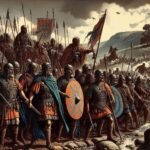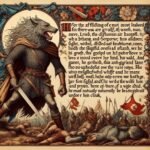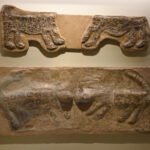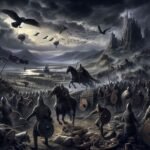
This article is unusual for Brigantes Nation. I think you can call it channelled, since essentially, I found I had a voice in my head telling me it. Treat it as fiction.
I think this is just the first instalment, but it’s difficult to say when the next one will come.
And the world fell apart – episode one
It was the first time we had met, in a very long time. Triggered by new threats to our kingdoms. We intended to form an alliance, to defend our borders. But that did not happen. There was a falling out during a ritual of truth, a thing was said, a thing was done, and the world fell apart.
This is a story about Thornborough Henges. It’s also a story of Brigantia, and of ancient Britain at a pivotal time. This is the story of my ancestors. This is a story of loss, of disaster, but also one of eternal hope.
I’m not sure how to express them. These feelings’ ad thoughts I seem to have tuned into. But I think I’ll just let them flow, and see what we get.
Venutius and Cartimandua had travelled to Thornborough late. They had been having to deal with numerous issues back in their capital, related to the emerging threat of the Roman’s, who had been expanding their control over Britain. Most of the south was already theirs. Now the northern tribes had decided to gather in order to agree a strategy of defence.
Those domestic issues may not be what you are thinking. They were actually about local dissent and increasing sentiment to acquiesce to the Romans – to welcome the Romans with open arms.
You see, this was very much like the emergence of consumerism in your own culture. The Romans displayed great wealth, and this had been turning heads throughout the kingdom. This Roman threat was not just about a loss of control. It was worse than that, it was a threat to our very culture. To our way of life.
Boudica was there. She was under the greatest threat and was in active combat with the Romans on several fronts. She wanted the tribes to send their warriors to her, to stop the Romans once and for all.
Many of the other leaders were more concerned about their own kingdoms and wanted to sit tight and strengthen. The truth was, they were scared. Scared that if they let their warriors go to help Boudica, they would feel all the more vulnerable themselves.
I said to Venutius, as we travelled to Thornborough, “How do you think this will go?”.
Venutius had his own plans against the Romans. As he saw it, Boudica was already lost. He felt that the only way to defeat the Romans was if we could lure them into a trap of our own making. Using the land to our advantage, on a grand scale. He felt that his plan – which was for everyone to fall back to the north of Brigantia, where the land works more in our favour, as part of an overall strategy to ultimately defeat the Romans and win back our kingdoms, was the only one likely to work.
Venutius admitted his own plan was going to take a lot of convincing. He was convinced that to win, we had to act as a nation, not as a collection of kingdoms. He though Boudica would never leave her lands and many other leaders felt the same. He said he understood how they felt.
Cartimandua added that she would only support Venutius’ plan if we had a majority buy in to it. She believed that Venutius’ plan was also the only one likely to defeat the Romans, but it needed everyone to support it. And that if this support did not happen, then she thought we should accept Roman rule as an inevitability, and it was better to start negotiations on that basis if we could not get the support of all the tribes.
So we travelled through the night, in our train of carriages, each of us brooding silently about things to come.
Dawn was breaking as we arrived at Thornborough. Our camp was to be close to the location of the deserted village close to Thornborough on your maps. Each of the kingdoms represented were allocated their own space for camp. For the sake of the gathering, each of these spaces were regarded as extensions of their kingdom. Within their camp, their own laws and rules help sway on any visitors.
There was no time for rest, as the opening ritual had already been delayed pending our arrival and the other leaders were now keen to get on with the formal aspects of the gathering.
Cartimandua, our Queen and head of the Kingdom, got dressed in her robes of leadership and went off to the formal breakfast to meet the other leaders. Only they could attend this gathering, which was intended to be an informal way of sharing ideas ahead of the main meeting.
Your readers will be interested to know how we used the henges for our gathering. For the longest time, Thornborough had been come to be used as a place for national gatherings of the clan leaders. Not as a regular thing, but for critical events. These gatherings were often used as power displays, since the usual reason for such gatherings was major territory disputes.
Typically, all three henges were used in our gatherings. Each day of the gathering involved three key events, one in each Henge. The morning event was the leadership breakfast, and in this case opening ritual. This was held in the Northern Henge, and that’s where Cartimadua had headed off to.
In the afternoon, the central henge was used for the
Cartimandua was our Queen and ultimate head of state. Venutius was her husband, and regent King, who traditionally only had a minor role in the affairs of state. So was excluded from much of the meetings in the gathering. He was only going to get to speak at the evening gathering, in the Southern Henge.
Although the regent typically played only a minor role in our governing structures. Venutius, due to his recent involvement in the defence of Brigantia was actually the head of our army. Cartimandua was impressed with Venutius’ strategic thinking when it came to such matters. He did not get lost in the emotion of the battle and always had the overall good, and stability of the kingdom in mind. For internal disputes he was quick to negotiate, and had the flexibility of wit to come up with workable compromises which Cartimandua always approved of.
Yes, at this point, the relationship between Venutius and Cartimandua was in an excelled state. Which makes the events I’m going to tell you about, that happened that day, all the more surprising.
I was the royal sword bearer. Cartimandua, being a woman, carried no sword. And the formal solution of a Brigantian tribal leader without a form of personal defence was for Venutius to be her sword user, and for me to be her sword bearer. In effect, she had two formalised defenders or her security.
Venutius had his own event to attend to. Just as the leaders had their formal breakfast, so did the leaders’ partners – wives mainly, and in this case, Venutius was the only man to attend. Venutius understood the value he could add by attending these meetings. Not only was it a great way to learn about the other kingdoms, but also, he knew that this was a good opportunity to influence the other leaders.
For me, as the only sword-bearer there, I had my own ceremonial responsibilities. And my first one, was to cut the corn of the kingdom. This was one of the oldest rituals that we adhered to at such gatherings. It came from an ancient tribal story. Of a time before the tribe really existed. We used to roam, to travel from place to place, to enjoy the bounty of that particular location for a while, then move on, to other bountiful locations, or to more sheltered places during winter, for example.
At this time, the tribe may have been about 200 people, one of many such roaming tribes in our lands.
Then one day, we came across a tribe who had moved into one of our preferred places. And it looked like we were going to have to fight to keep it. The other tribe sent out a messenger, with an invitation to meet and negotiate, and our leader agreed and followed the messenger to the meeting place.
At the meeting, the other tribe announced that they were not from these lands, that they had come far, and they had come to meet us! They said that their leader had a dream one night that told him of a very different future for his people, of a plan for a new way of life, and that this plan would only work, if they could find this location, and agree with the people who used to, for a new plan of working together.
This was actually, the birth of what we call Brigantia today. It was the establishment of the first permanent settlement for our people. And the cutting of the corn ceremony marks the time when those tribes first agreed to share their resources, starting with food.
You might think it sounds like a significant ritual, but these days, it’s not. There are many rituals and ceremonies related to that time, and this one is actually more like something you can give a spare part to do during the gathering. The chances are, I’ll have three people in attendance and all of them will be formally obliged, like I am, to do it.
Note about this information – It seems there’s a lot of interpretation involved in this process, and it’s likely that I’ve chosen some words which are the best available to my vocabulary rather than what is factually correct. For example, Corn is used because it’s a word modern people can relate to similarly to how the Iron Age people related to spelt, which is much more like the actual word that should be used.
You can subscribe to a mailing list specifically for this series of articles. Your information won’t be passed on or used for any other purposes. I don’t know how often I will be publishing, or how many articles I will write.
















